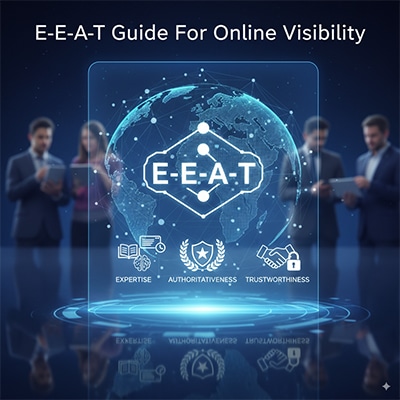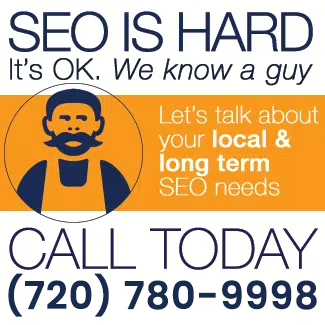How Can Small Businesses Can Outrank Large Corporations with Local Experience
Google now rewards businesses that share real, hands-on experience over generic advice copied from other sources. Furthermore, if you’ve actually helped customers solve problems, you have a major advantage over larger websites that simply rehash information without practical knowledge.
Q: How can local experience beat big-brand content?
A: Share firsthand jobs, photos, and lessons from real customers. Specific, verifiable stories signal genuine expertise that large, generic content can’t fake. This raises relevance, trust, and click-throughs locally—where decisions actually happen.
This is pretty heady and nerdy stuff. None is this is as easy as it used to be (as if it was easy before!) Got your hands full? The Affordable Web Guy can help take care of it for you. We specialize in keeping small business websites running smoothly so you can focus on what you do best.
What Changed and Why Small Businesses Should Care
Q: What did Google change about evaluating content?
A: Google added “Experience” to its quality framework and cracked down on thin, unoriginal content. Businesses that show hands-on proof—process, outcomes, and lessons learned—gain an edge over sites that only compile research.
Picture this scenario: you need a reliable plumber. Would you rather read advice from someone who’s fixed thousands of pipes, or from a content writer who researched plumbing online but never held a wrench?
Google made the same choice in December 2022, adding “Experience” to their quality guidelines. Subsequently, the March 2024 core update reinforced this direction, targeting low-quality content and favoring authentic, experience-based information.
This shift creates opportunities for small business owners because you have something large corporations can’t fake: real experience serving customers.
Google’s Quality Framework: Why Your Experience Matters
Q: What does E-E-A-T actually evaluate?
A: Experience (you’ve done the work), Expertise (professional knowledge), Authoritativeness (others recognize you), and Trustworthiness (secure, transparent, accurate). Make each visible on-page with concrete examples, credentials, citations, and clear contact details.

Experience: Have you actually done what you’re writing about? This means sharing real situations you’ve encountered, problems you’ve solved, and lessons you’ve learned from working with customers.
Expertise: Do you know your field professionally? This combines your training, certifications, and deep knowledge gained from daily work in your industry.
Authoritativeness: Do others recognize your expertise? This includes customer referrals, industry partnerships, and community recognition of your knowledge.
Trustworthiness: Can people count on you for honest, reliable information? This encompasses website security, transparent business information, and consistent, accurate advice.
As a small business owner, you likely already possess more real experience than most online content creators. The key is sharing it effectively through your website and content.
How to Show Your Real-World Experience Online
Q: What proof of experience works best?
A: Before/after photos, project write-ups, customer questions answered with specifics, and lessons learned from mistakes. These are hard to fake and easy for users—and algorithms—to trust.
Your hands-on experience becomes your secret weapon because large websites can’t manufacture the practical knowledge you’ve gained from actually serving customers.
Tell specific stories rather than giving generic advice. Instead of writing “How to Choose Kitchen Cabinets,” create content like “Problems I’ve Solved Installing Cabinets in 200+ Denver Homes.” Share actual challenges you’ve faced, solutions you’ve developed, and insights that only come from real experience.
Include photos from actual projects. With customer permission, show before-and-after pictures of your work. These images prove you’ve done what you’re discussing while giving readers confidence in your abilities.
Address questions customers actually ask. You know the concerns that come up in every conversation. Write content answering these real questions instead of generic topics you think you should cover.
Share lessons learned from mistakes. Every experienced professional has learned from things that didn’t go perfectly. Sharing these lessons (without naming specific customers) demonstrates authentic experience and helps future customers avoid similar issues.
Building Trust Through Complete Transparency
Q: What are the fastest trust signals to add?
A: Prominent phone, email, and physical address on every page, HTTPS, fast load times, detailed About page, and specific testimonials that describe problems solved—not just “great service.”
Trust forms the foundation of everything else. Without trust, your experience and expertise won’t matter to potential customers or search engines.
Make it easy to contact you. Include your complete business address, phone number, and email address on every page. This seems basic, but many websites hide this information, which makes both Google and customers suspicious.
Tell your complete story. Create a detailed “About Us” page explaining your background, training, and experience. Include photos of yourself and your team because people want to know who they’re considering hiring.
Feature real customer feedback. Showcase genuine testimonials that include specific details about work you performed and results you achieved. Generic praise like “great service” carries less weight than specific stories about how you solved particular problems.
Keep your website secure and fast. Ensure your site loads quickly on mobile phones and uses HTTPS encryption. These technical elements signal trustworthiness to both Google and customers.
Creating Content That Actually Helps Your Customers
Q: How do I write content that ranks and helps?
A: Answer the main question in the first paragraph, then expand with clear steps, when to DIY vs call a pro, and local factors that change the answer. Keep the tone conversational and practical.
The most important shift involves writing for your actual customers rather than search engines. This approach naturally improves search rankings because Google rewards content that genuinely helps people.
Answer the main question immediately. If someone searches for “cost to replace a water heater,” give them a realistic price range in the first paragraph. Then explain factors that affect pricing throughout the rest of the article.
Write like you’re talking to a friend. Use the same language you use when explaining services to customers in person. Avoid industry jargon unless you explain what it means in simple terms.
Cover topics thoroughly. Consider what questions arise after answering the initial search query. If you explain furnace maintenance, also address when to call professionals and what warning signs to watch for.
Connect everything to your local area. Explain how local conditions affect your recommendations. Different climates impact HVAC efficiency, while soil types affect foundation work differently. This local knowledge sets you apart from generic online content.
Simple Steps to Get Started Right Away
Q: What are the first three action items?
A: Install Analytics and Search Console, document the exact phrases customers use, and publish one comprehensive guide per month based on real jobs you’ve done.
Rather than trying to implement everything at once, focus on these fundamental steps that make the biggest difference:
Set up measurement tools first. Install Google Analytics and Google Search Console on your website, then claim your Google Business Profile. These free tools help track what’s working and what needs improvement.
Document how customers actually talk. Keep notes about exact words customers use when describing problems or asking for services. This natural language becomes the foundation for content topics.
Create one comprehensive guide monthly. Choose a topic where you have substantial experience and create detailed content covering everything someone would need to know. One excellent article outperforms five shallow ones.
Build relationships in your community. Join local business groups, partner with complementary businesses, and participate in community events. These relationships often lead to natural mentions and referrals that Google recognizes as authority signals.
What Success Looks Like and Realistic Timelines
Q: How long until results show up?
A: Expect foundational setup in month one, initial movement by months two–three, and more reliable gains around months four–six—assuming consistent, experience-led content and site hygiene.
Understanding realistic expectations helps you stay motivated and make good decisions about where to invest time and energy.
Month One should focus on foundation building. Set up measurement tools, audit existing website content for basic issues, and begin documenting customer language and frequently asked questions.
Months Two and Three involve creating your first comprehensive content pieces while optimizing your highest-potential existing pages. This is when you establish your content creation routine.
Months Four Through Six typically show initial improvements in search rankings and website traffic. Some businesses see results sooner, but six months represents realistic expectations for meaningful progress.
Long-term success comes from consistency rather than intensity. Publishing one excellent article monthly while maintaining high-quality customer service creates sustainable growth that compounds over time.
The most important mindset shift is viewing content creation as customer service rather than marketing. When you focus on genuinely helping people solve problems using your real experience, search engines naturally reward this approach with better visibility.
Why This Approach Works Long-Term
Google’s changes reflect a broader trend toward valuing authentic expertise over manufactured content. The March 2024 update resulted in a 45% reduction in low-quality, unoriginal content, benefiting businesses with real experience.
This trend benefits small businesses because large corporations can’t replicate genuine relationships and local knowledge that small business owners develop through years of serving their communities.
Your competitive advantage isn’t having the biggest marketing budget or fanciest website. Instead, it lies in having real solutions to real problems based on actual experience. By systematically sharing this knowledge through helpful content, you build trust with both search engines and potential customers.
Businesses thriving in this environment consistently demonstrate genuine expertise through real customer experiences, maintain strong community connections, and create content that truly serves their audience’s needs. This approach requires patience and consistency, but builds sustainable visibility that grows stronger over time.
Ready to Improve Your Online Visibility?
Creating content that showcases your experience doesn’t require complex technical knowledge—it requires sharing what you already know in ways that help your customers.
At The Affordable Web Guy, we help small businesses build websites that showcase their expertise while meeting Google’s quality standards. Our SEO services focus on helping businesses share their real experience effectively online.
Schedule a free consultation to discuss how your website can better demonstrate your expertise and attract more local customers.
Sources used in this guide include Google’s official Search Quality Rater Guidelines, Search Engine Land’s algorithm update tracking, and current industry research from reputable SEO publications. While search algorithms evolve continuously, the strategies outlined here focus on creating genuinely helpful content that serves both users and search engines.
Author Note: You think I had all of this on the top of my head? Not so much. This content was researched and compiled by Anthropic AI using official Google documentation and verified industry sources. While I strive to provide accurate guidance based on current best practices, search algorithms evolve continuously. For complex technical questions, consider consulting with local SEO professionals.


Leave A Comment